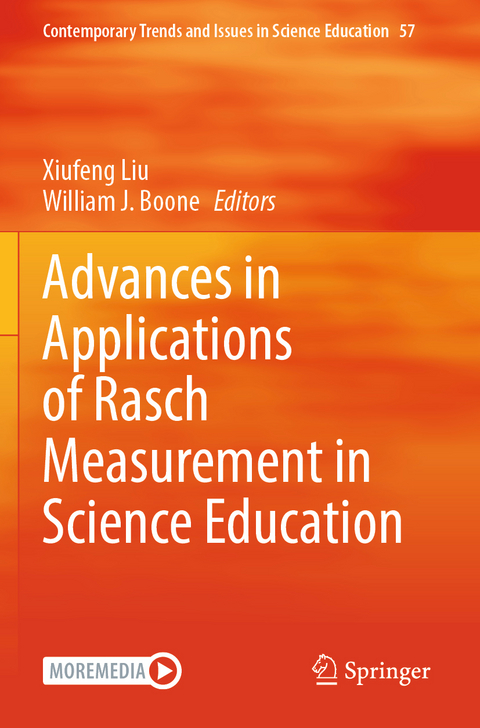
Advances in Applications of Rasch Measurement in Science Education
Springer International Publishing (Verlag)
978-3-031-28778-7 (ISBN)
This edited volume presents latest development in applications of Rasch measurement in science education. It includes a conceptual introduction chapter and a set of individual chapters. The introductory chapter reviews published studies applying Rasch measurement in the field of science education and identify important principles of Rasch measurement and best practices in applications of Rasch measurement in science education. The individual chapters, contributed by authors from Canada, China, Germany, Philippines and the USA, cover a variety of current topics on measurement concerning science conceptual understanding, scientific argumentation, scientific reasoning, three-dimensional learning, knowledge-in-use and cross-cutting concepts of the Next Generation Science Standards, medical education learning experiences, machine-scoring bias, formative assessment, and teacher knowledge of argument. There are additional chapters on advances in Rasch analysis techniquesand technology including R, Bayesian estimation, comparison between joint maximum likelihood (JML) and marginal maximum likelihood (MML) estimations on model-data-fit, and enhancement to Rasch models by Cognitive Diagnostic Models and Latent Class Analysis. The volume provides readers who are new and experienced in applying Rasch measurement with advanced and exemplary applications in the forefront of various areas of science education research.
Xiufeng Liu is a Professor of Science Education at University at Buffalo, and a Fellow of the American Association for the Advancement of Science (AAAS). He conducts research in applications of Rasch measurement in science education, particularly on conceptual learning and assessment. He is the author of Using and Developing Measurement Instruments in Science Education: A Rasch Modeling Approach (2nd Edition, IAP).
William Boone earned his Ph.D. from the University of Chicago's Program in Measurement, Evaluation and Statistical Analysis (Dept. of Education). He is the lead author of the two books- 1) Rasch Analysis in the Human Sciences, 2) Advances in Rasch Analysis in the Human Sciences. Professor Boone presents Rasch workshops throughout the world. Dr. Boone is a professor at Miami University (Oxford, Ohio, USA).
Forward.- Preface.- Chapter 1 Introduction to Rasch measurement in science education: Principles and best practices.- Chapter 2 Rasch models: Recent Developments.- Chapter 3 Open source packages for conducting Rasch analyses.- Chapter 4 Using Rasch measurement to study learning progression in science education.- Chapter 5 Using Rasch measurement to develop formative assessment in science education.- Chapter 6 Using Rasch measurement for cognitive diagnostic testing in science education.- Chapter 7 Using Rasch measurement for computer adaptive testing in science education.- Chapter 8 Using Rasch measurement for setting performance standards in science education.- Chapter 9 Using Rasch measurement to assess complex science learning outcomes in science education.- Chapter 10 Using Rasch measurement to research three-dimensional science learning in science education.- Chapter 11 Using Rasch measurement to investigate student reasoning.- Chapter 12 Using Rasch measurement to develop observation protocols in science education.- Chapter 13 Using Rasch measurement to investigate science teachers' pedagogical content knowledge in science education.
| Erscheinungsdatum | 04.08.2024 |
|---|---|
| Reihe/Serie | Contemporary Trends and Issues in Science Education |
| Zusatzinfo | IX, 529 p. 1 illus. |
| Verlagsort | Cham |
| Sprache | englisch |
| Maße | 155 x 235 mm |
| Gewicht | 809 g |
| Themenwelt | Sozialwissenschaften ► Pädagogik ► Erwachsenenbildung |
| Schlagworte | Applications of Rasch measurement • Applications of Rasch measurement in science education • Applications of Rasch modeling • Applications of Rasch modeling in science education • Developing measurement instruments using Rasch modeling • rasch analysis • Rasch based instrumentation • Rasch measurement • Rasch modeling • Rasch Theory • Science assessment using Rasch measurement • Science education evaluation using Rasch measurement |
| ISBN-10 | 3-031-28778-9 / 3031287789 |
| ISBN-13 | 978-3-031-28778-7 / 9783031287787 |
| Zustand | Neuware |
| Informationen gemäß Produktsicherheitsverordnung (GPSR) | |
| Haben Sie eine Frage zum Produkt? |
aus dem Bereich


